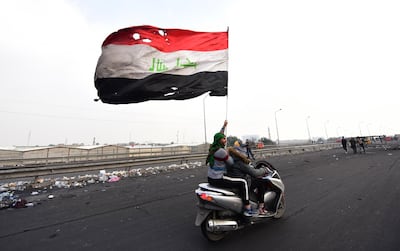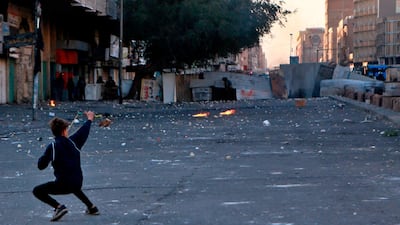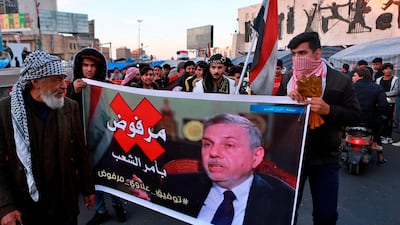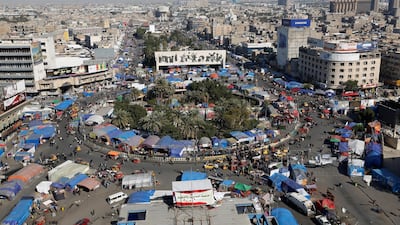Karim has the appearance of a typical Iraqi teenager. The 17-year-old Baghdad native spends a lot of time on his mobile phone, wears braces and has long black hair. Karim is from a generation raised after the 2003 US invasion. He has known only war.
"I didn't have a childhood because I was born in 2002," Karim, whose parents asked him not to use his real name, told The National. "Children in Iraq have no rights."
Karim, a student, joined anti-government protests in October. But in December he fled to Erbil, the capital of Iraq’s autonomous Kurdish region, fearing for his life.
“Militias wanted to kill me because I was live streaming,” Karim said. “They sent me a message.”
Several Iraqi activists are sheltering in Erbil, where they are safe from militias and others who continue to kill and kidnap protesters in Baghdad.
Anti-government demonstrations began in October, with protesters marching against corruption and the sectarian power-sharing system that has persisted since the US invasion.
Many of the protesters openly criticise Iran’s influence and its backing of Iraq’s Popular Mobilisation Forces, also known as the Hashd Al Shaabi.
More than 500 Iraqis have been killed since the protests started and dozens of activists and protesters are missing.
‘They put out cigarettes on us’
Karim said his troubles began when he started live streaming and taking pictures at the protests. He was first beaten on October 2. Six days later he was arrested. The security forces took him to the detention centre at Al Muthana airbase at Baghdad International Airport where many protesters have been held.
“They made us close our eyes and put out cigarettes on us,” he said.
Karim was one of those celebrating in the streets after Iraq’s politically charged football win over Iran on November 14. Security forces set up many roadblocks that night.
“After the game, the way home was closed,” he said. “Riot police saw me and said ‘come here’.” Karim might have got away, but he knew he was in trouble when they asked for his phone.
“They opened it and saw the videos [of the protests].”

Karim does not know where they took him, saying only that it was an abandoned building.
The phone threats began after he was released a week later. He left school and his work in a family business as a result. An unknown group of men then caught his cousin and broke his fingers, demanding to know where Karim was. On December 8, a friend passed Karim on a motorbike, throwing him a bag of clothes and money and telling him to leave.
Karim departed the next day. He bought tickets from three bus companies that operate routes from Baghdad to Erbil, giving each his name. He took a fourth and final bus to Erbil for the journey, for which he did not give his name. He said he feared militias were checking the names on the travel logs.
‘Many of my friends have been kidnapped’
Ahmed Al Badri, 28, is an activist who fled to Erbil from Baghdad. He gave his real name to The National, saying he will not return to Baghdad any time soon on the advice of his friends.
Mr Al Badri is a long-time activist who began protesting in 2011. Before fleeing Baghdad, he worked in civilian society and for a government ministry. He was aware of the risks when he took to the streets in October.
“Many of our friends have been kidnapped,” he said.
Mr Al Badri almost became one of the disappeared.
“On October 24, I was going home when two cars stopped [near me],” he said. “They tried to kidnap me.”
The men fled only when the neighbours noticed what was happening, Mr Al Badri said.
“I was lucky. I grabbed an electric pole and shouted,” he said. “Many neighbours heard and came out.”
The men then left. Mr Al Badri. He said he came to the Kurdish city the same night by taxi from Baghdad. The ticket costs about $30 (Dh110) and the trip takes about four hours, depending on traffic and checkpoints.
Not all those who fled have had such close calls. Salma, 27, who declined to give her real name, said just the chance of being questioned by the security forces prompted her to take a taxi to Erbil in December.
“My friend was arrested,” she said. “They went through his messages and saw my messages and asked many questions about me.”
Salma, who took part in the protests, feared the security forces could learn of her work for a US company and accuse her of being a spy.
A Kurdish safe-haven
Erbil was a natural safe haven for these activists. Since the 2003 invasion and through the ISIS crisis, the Kurdistan Regional Government area has been safer than much of federal Iraqi territory.
There is historical precedent for Iraqis fleeing to the Kurdish region. Many Sunni Arab supporters of Saddam Hussein live in Erbil. Some people from Mosul live in the Kurdistan region because they fear the Popular Mobilisation Forces. Iraqi communists lived in the Kurdistan region amid repression from Baghdad.
Mr Al Badri said he plans to stay in Erbil, where he has a job, indefinitely. He speaks to his fellow activists in Baghdad daily and said he chose Erbil because he felt it was the closest, safest option, outside the reach of the Iran-backed militias. Karim, however, said he will go back to Baghdad.
“It’s dangerous, but I’m not afraid,” he said.
‘We will win’
The activists’ move to Erbil is a big disruption to their lives. Mr Al Badri misses his family and the stability he enjoyed there. “I lost my job,” he said. “And my family is still there.”
Karim said he first became angry at the situation in the country in the early 2010s when youngsters identifying as “emo” – the punk subculture characterised by black clothing and emotional music – were being killed.
Karim is mad at many things – the Iranian government and religious extremism in particular – but he feels the protests will, ultimately, succeed.
“Religious ideas are in everything. They say certain types of pants are forbidden,” he said. “But we will win.”










